Favorite YA Books of 2016
Yes, it’s list time. What follows are 16 of my favorite 2016 books that I reviewed and excerpts of my reviews. Even though I’m a voracious reader, I’m sure I missed a lot of great titles this year. I always enjoy reading the many lists that crop up this time of the year, but I also always want more variety and to hear from more people. So here’s my list—will you share yours with us too? Leave us a comment or hit me up on Twitter where I’m @CiteSomething.
Thomas and Mallory have barely spoken in years. They haven’t really been friends for 7 years. But when Mallory needs a ride home, after punching her boyfriend at a party, he’s there for her. Even though he’s not really sure what she needs or why she turned to him for help, he’s there. What could have been a simple ride home—drop her off and be done—turns into an all-night adventure. It’s hard to tell if the timing couldn’t be better or couldn’t be worse. Goodness knows they both need a distraction. Thomas is supposed to leave for the Army in the morning, though he has no intention of actually going, a secret he reveals to Mallory and to a few others as the night wears on. And Mallory? She has her own reasons for freaking out and needing to focus on something else for a few hours. It’s graduation night. They should be elated. But both Thomas and Mallory are feeling the nearly unbearable weight of expectation and uncertainty as well as the desire to go away, do the unexpected, follow their own paths.
ADVERTISEMENT
ADVERTISEMENT
MEET ME HERE will inspire important conversations about post-traumatic stress disorder, expectations, friendship, and toxic masculinity. On the surface it could seem like Thomas and Mallory’s friendship just fizzled out, or like Jake just isn’t himself, or like our main characters are feeling an uncertainty about their futures that might come from it being graduation night— a time for endings, beginnings, and thoughts of the future. But Bliss infuses every one of those things with much deeper issues that get explored more thoroughly as the story goes on and as secrets are revealed. This well-written and affecting book is a must-have for every collection. Teen readers may not be in exactly the same situations as Thomas or Mallory but will recognize the feelings of uncertainty and the pressures of expectations as well as appreciate the quiet thread of hope woven throughout. (See the full review here.)
 Georgia Peaches and Other Forbidden Fruit by Jaye Robin Brown
Georgia Peaches and Other Forbidden Fruit by Jaye Robin Brown
The fact that the story is so much about faith and identity was really interesting and, again, feels like something we don’t see a whole lot of. Joanna moves to small Rome, Georgia for her senior year. She thinks of it as “where queer girls go to die.” For a lot of reasons (none of them particularly great), her reverend dad would like Joanna to go back in the closet, or “lie low” as he calls it. Tied to this is the fact that Joanna intends to start her own radio ministry, like her dad, to help support kids like her—gay kids of faith and teens in general. If Joanna “lies low” for the year, she can eventually share her true self again with people and come out on her radio show.
The whole deal seems kind of bonkers, but she goes along with it. She gets a makeover to appear more “normal,” in a kind of “why not go for broke?” move. Joanna starts attending the youth group at her new stepmother’s church, quickly becomes friends with a close-knit group of girls, and suddenly is doing things like going to football games, parties, and sleepovers. The story could stop there—could just be about a girl who was out but now isn’t, and how faith ties in with all of it—but it takes the much more interesting step of having Joanna fall for Mary Carlson, a seemingly straight girl and the sister of Joanna’s one other real friend, B.T.B. She keeps getting signals that maybe Mary Carlson could be into her—something she finds almost impossible to believe but readers sure won’t—and before long finds herself in a super weird position: dating a girl who wants to come out, but pretending her (Joanna’s) attraction to girls is also a new revelation, and really needing to not be out herself, to keep up her part of her agreement with her dad. (See the full review here.)
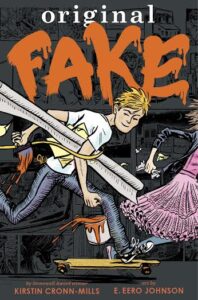 Original Fake by Kirstin Cronn-Mills with art by E. Eero Johnson
Original Fake by Kirstin Cronn-Mills with art by E. Eero Johnson
Frankie’s hero is Uncle Epic, a street artist from the Minneapolis area. He can’t believe the wild twists and turns his life takes on when he’s swept up in Uncle Epic’s world when he’s befriended by cousins Rory and David, whose actual uncle is Uncle Epic. “Cool stuff never happens to me,” Frankie thinks. Before long he’s part of Epic’s street team, helping prepare and install art pieces all around the city. That’s pretty cool, and just as cool is the fact that Frankie finally feels like he has friends. Rory is the prettiest girl in Frankie’s grade, with a reputation for using boys then breaking their hearts—naturally he has a crush on her. David is a skirt-wearing gay kid with a quick sense of humor and a creative streak a mile wide. Frankie’s experience with Epic’s art projects combine with his resentment of Lou to fuel his own public art projects—ones whose purpose is both humor and revenge—which end up giving him more attention than he could have expected. Suddenly, Frankie’s helping Rory yarn bomb, helping Epic with his art, drawing attention (under a pseudonym) for his own weird public art, and trying to stay off the police’s radar. Though he keeps landing in hot water with his parents, as he sneaks out night after night, it’s all worth it to Frankie, who finally feels like he has something that’s his.
I absolutely adored this book. As a character-driven reader, I was delighted by how fantastic and unique Frankie, David, Lou, their parents, and really everyone was. There is a lot to talk about here about art, gender, and families. And let’s talk about the illustrations for a minute. If you check out the cover reveal post we did, you can peek at more of the art than just what you see on the cover. Using oranges, black, and white, Johnson’s illustrations greatly add to the story and at times take over the telling of the story. It would have been a shame to have this brilliant book all about art not have illustrations showing us that art. Frankie, Lou, and David’s adventures really come to life thanks to the combined skills of the writer and the illustrator. ORIGINAL FAKE stands out in every way—great characters, great writing, great art. Give this to art-loving, oddball, slightly subversive readers who appreciate a good caper. (See the full review here.)
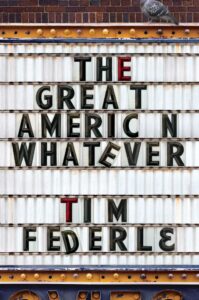 The Great American Whatever by Tim Federle
The Great American Whatever by Tim Federle
In the six months since his sister was killed in a car accident, Quinn has hardly left his bedroom. He hasn’t gone to school or talked to his best friend and has barely interacted with his heartbroken mother. He hasn’t turned on his phone, either, knowing the last text his sister sent before running a red light was to him. Urged on by his best friend, Geoff, Quinn reluctantly emerges from his isolation just in time to meet a cute boy, turn 17, rediscover his passion for writing screenplays, and uncover some big secrets about the people he thought he knew best. He also gets some advice from a former idol, a neighbor turned Hollywood screenwriter: forget the rules of what’s expected in a script and just write the truth. For Quinn, who seeks solace in his daydreamy scripts with imagined conversations and outcomes that he can control, this is a hard pill to swallow, especially as he’s learning some truths he’s not really sure he likes. Even under the weight of grief, Quinn’s conversational and charming narrative voice effervesces, mixing humor and vulnerability in typical Federle style. Quinn’s story is at turns sad, funny, awkward, and endearing as he figures out friendship, romance, coming out, and moving on. VERDICT Federle’s YA debut about life’s unscripted moments has wide appeal and is an essential purchase for all collections. Readers will be instant fans of the funny and honest Quinn. (See the full review, which originally appeared in School Library Journal, here.)
Sometimes I don’t think about what’s missing from YA until I read a book that includes whatever that thing is and think, Oh! Hello there! YA desperately needs you! In this case, the “you” is Pen, a butch Portuguese lesbian who’s committed to being herself even though most people around her don’t understand—and don’t want her to have—her identity. Pen has a small group of friends—though “friends” is not really the right word because 2/3 of her group are utter jerks. Her supposed best friend is Colby, a neighbor boy who accepts her for who she is and protects her… but who also is incredibly mean, abusive, manipulative, and threatening. Pen begins to pull away from him when she becomes friends with Blake (her soon-to-be girlfriend) and Olivia (one of Colby’s recently-cast-aside conquests). As far as Colby is concerned, Pen exists to help him get girls and to remain “loyal” to him. Her pursuit of other relationships, especially one of friendship with Colby’s ex, is a betrayal to him. I probably hate Colby more than I’ve hated any other character I’ve read this year. He’s an awful human being.
Thankfully, in addition to her new friends, Pen also has her brother in her corner. Johnny has always stood up for Pen, who has a long history of suffering slurs and being shamed for who she is. Her parents don’t understand her at all. They feel she isn’t respecting them, that she isn’t being a “good girl.” Her mother would like her to look like a “princess,” horrified at Pen dressing in Johnny’s old clothes and shaving her head. Pen talks about having always been a tomboy. She’s often mistaken for a boy. She repeatedly says she doesn’t want to be a boy—she’s not transgender—but she’s not entirely comfortable being thought of as a girl (or at least as a stereotypical girl). She never uses words like genderqueer or nonbinary, or butch, for that matter—that word is mine. Pen comments often on what words like “boy” or “girl” mean to her, in regards to how she thinks of herself. She also thinks, “But I don’t think of myself as being gay, because that word sounds like it belongs to some guy. Lesbian makes me think of some forty-year-old woman. And queer feels like it can mean anything, but like—am I queer because I like girls, or because I look the way I do? Maybe I don’t know enough words.” She also just really doesn’t get why people care so much and need to label her. As she tells Olivia, during a conversation about if Pen could be trans, “I don’t feel wrong inside myself. I don’t feel like I’m someone I shouldn’t be. Only other people make me feel like there’s something wrong with me.” (See the full review here.)
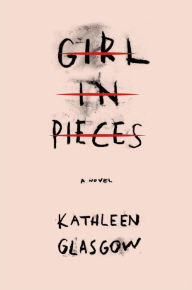 Girl in Pieces by Kathleen Glasgow
Girl in Pieces by Kathleen Glasgow
We meet Charlie as she is just getting settled in a treatment facility. She’s a cutter who has done too thorough of a job and just spent a week in the hospital. At the facility, she’s silent—selective mutism. She’s been through a lot. Prior to landing in the facility, she was homeless for nearly a year. Now in treatment, she’s getting the help she so desperately needs, grateful to be indoors, warm, and fed. But money and/or insurance doesn’t last forever, and way too soon she’s being cut loose, released to her abusive mother. Instead of going home with her mother, she’s handed some money, her birth certificate, and a bus ticket to Arizona. Great parenting. Charlie heads out there alone. Her friend Mikey is there, but Mikey’s tied to a lot of her past. He’s also not around much, so when he leaves on tour with a band, Charlie is truly alone. She gets a job washing dishes at a cafe, where she meets Riley, a sometimes charming junkie ten years her senior who quickly gets into her head, heart, and pants. Riley is horrible for Charlie. She’s trying so hard to move on from her past, but that’s not easy. Every day is a struggle for her to not cut herself. She makes a lot of crappy choices around and because of Riley. There are small good things mixed in among all this bleakness. Charlie finds solace in drawing and is going to have some of her art in a show. She’s making… I wouldn’t say “friends” at work, but she’s interacting with her coworkers and coming out of her shell a little. And when things fall apart in a pretty epic way, Charlie learns she has more support, resources, and hope than she had imagined. (See the full review here.)
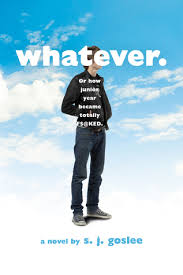 Whatever.: Or How Junior Year Became Totally F$@cked by S.J. Goslee
Whatever.: Or How Junior Year Became Totally F$@cked by S.J. Goslee
I completely loved this book. It took me a little while to warm up to it (I think my problem is that I really wanted this to be written in first person, not third), but when I did, I couldn’t put it down. Many books are billed as being “hilarious” but totally miss the mark. This book is truly hilarious. As a person who enjoys sarcasm, trash-talking, swear words, and 90s music, this book spoke to me. Mike’s whole world gets rocked when Lisa, the girl he thought of as his girlfriend, tells him she wants to see other people. She points out to him that she’s not actually his girlfriend, but just a friend who he sometimes goes out with and makes out with. He’s not really broken up over her announcement. What does shock him, though, is her reasoning why he should be her student council running mate: they can sell him as gay—“it’ll be edgy.” Wait, Mike’s gay? This is news to him. Or is it? Turns out Lisa (and many others) were recently witness to him making out with a dude at a party, a fact that Mike himself doesn’t remember. Lisa tells him not to be so quick to dismiss the idea that he’s bi. Before long, Mike is accepting this (maybe) new truth about himself. He knows there’s nothing wrong with being bi, but he’s not so sure he’s ready for people to know yet when he’s just kind of figuring it all out for himself. It doesn’t talk long, though, for people in his life to start knowing—his mom, his grandma, his close group of friends, and Wallace, his sworn enemy.
Before long, Mike is doing all kinds of new things: serving as student council VP, organizing Homecoming, hanging out with cheerleaders, navigating uncomfortable silent periods with his lifelong friends, and making out with a hot (if completely surprisingly into him) guy. (See the full review here.)
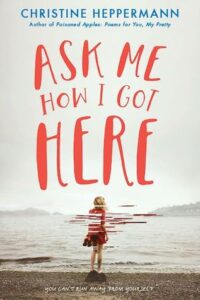 Ask Me How I Got Here by Christine Heppermann
Ask Me How I Got Here by Christine Heppermann
[The summary] tells you both everything you need to know and nothing. It doesn’t really convey how absolutely stunning the writing is. Or how honest the story feels. Or how fantastic Addie’s own poems are. It doesn’t really hint that the story takes a rather unexpected turn. It doesn’t tell you how supportive and great her parents are, or how generally supportive and great her boyfriend is.
Can you tell I loved this story?
Sometimes I read a book and it’s so glaringly obvious that this is an adult writing a teenager—nothing feels natural or genuine or believable about the teen voice. That isn’t the case here. Addie shines as a “real” teenager. She’s secretive and touchy and honest and curious. She makes a choice that she isn’t willing to allow to define her, then learns that the things that define her are changing. A gorgeous, smart, achingly real look at the things that make us who we are and reminds us that who we are is always changing. (See the full review here.)
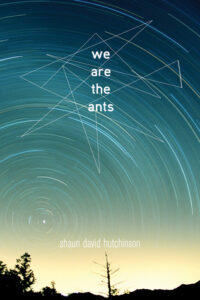 We Are The Ants by Shaun David Hutchinson
We Are The Ants by Shaun David Hutchinson
We first meet Henry when we read his words, the opening words of the novel:“Chemistry: Extra Credit Project. Life is bullshit.” Henry has spent the last year, if not the many years prior to it, too, honing his nihilism. Life is absurd and meaningless. We are insignificant and don’t matter. We’re just ants. So when he gets the chance to stop the world from ending, he really has to think it over. Why let the world go on? With all of the pain and misery and unfairness, why not let it all end? He’s looking at the big picture of things, sure, but this is also just about him. Is not wanting the world to go on the same thing as wanting to die? Is not believing the world–filled with so many mistakes and so much pain–deserves to go on the same thing as not believing that he deserves to go on? Is letting the world end just an extremely epic way to commit suicide? As we get to know Henry–grieving, lonely, guilt-ridden Henry–we see why he’s so conflicted over a question that might seem like it has an easy answer. Everything–the entire fate of the world–ultimately comes down to whether or not Henry wants to go on living.
Hutchinson’s latest book is a powerful look at depression, grief, guilt, families, bullying, hope, and the power to change. He shows us an extremely broken character, one who’s not convinced it’s worth it to even try to put the pieces back together, and really makes us wonder not only what will ultimately happen to the universe, but what will happen to Henry as he falls deeper and deeper into despair. (See the full review here.)
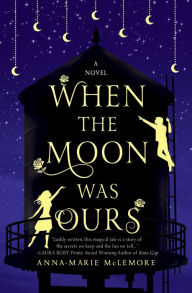 When the Moon was Ours by Anna-Marie McLemore
When the Moon was Ours by Anna-Marie McLemore
Pakistani Sam (or Samir) and Latinx Miel have been inseparable since Miel came pouring out of the collapsed water tower. Miel is taken in by Aracely, Sam’s neighbor. Now teenagers, Sam and Miel realize how they really feel about each other and what follows are many absolutely breathtakingly beautiful scenes of them kissing, and touching, and discovering each other. Discovery comes into play, too, with the four beguiling redheaded Bonner sisters, known locally as brujas and boyfriend-stealers. They’re convinced that getting some of the roses that grown from Miel’s wrist will help them regain their power over love. They threaten Miel, telling her if she doesn’t comply, they will spill the secrets about her mother. But it’s a second threat that holds even more power over Miel: if she doesn’t comply, they will show everyone Sam’s birth certificate, which shows that he was assigned the label of “girl” at birth. Miel would do anything to protect Sam, especially because she knows he needs the time right now to really be figuring out some big things. You see, Sam has always used the idea of bacha posh to explain himself. We learn that this practice exists in Pakistan and is something Sam learned about from his grandma when he was young. Bacha posh is a practice where girls dress as boys and live that way, to help out their family, be the man of the house, live with more freedoms, etc, eventually going back to dressing and living as girls when they get older. Sam grapples with this, wondering if that’s the most accurate way to think of himself—is there any possible world where he could imagine wanting to go back to who he was mistaken for in his youth? Other characters seem to know where Sam will eventually land on this, but he has to get there on his own. (See the full review here.)
By showing us not just the rape and presenting the story not just from the viewpoint of the victim, we are able to more fully see rape culture at work and understand all of the things that can come along with something like this. Jenny must deal with the reaction and desires of her parents and the advice from friends and advocates as well as the assumptions, lies, and harassment that come with the story getting out. We see what others are saying about her or about that night. We see misinterpretations and fuzzy memories and friends making bad choices and others trying to make good ones. We see the people who feel they share some of the blame and those who don’t feel at all responsible for what happened that night. We see the questions asked by people and the questions that get ignored. We see blame, guilt, and facts. And at the heart of everything is truth—something that can easily get buried under lies and blame and foggy memories. (See the full review here.)
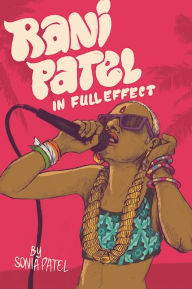 Rani Patel in Full Effect by Sonia Patel
Rani Patel in Full Effect by Sonia Patel
Overall, I found this to be a really interesting look at both a place and characters I haven’t seen in YA. Are we calling books set in the 90s historical fiction? The 1991 setting felt important because of the music that means so much to Rani. Will contemporary teen readers feel the impact of her references? Maybe not. A glossary in the back defines not just Gujarati words but also Hawaiian words, Hawaiian pidgin, and late 80s/early 90s slang. While it took me a little bit to get into the book, and the pacing toward the end felt rushed, once I got into the story, I couldn’t put it down. The author, a psychiatrist, includes a long note at the end saying that, like Rani, she is a Gujarati Indian who lived on Mokoka’i and loved hip hop. She also tells readers that she’s a psychiatrist and talks at length about sexual abuse and how it has affected Rani. She also offers resources. Rani’s story is one of growth and empowerment and is a book I’ll be thinking about for a long time. (See the full review here.)
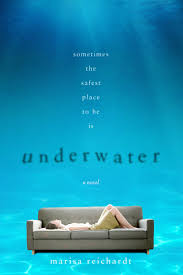 Underwater by Marisa Reichardt
Underwater by Marisa Reichardt
Morgan has been home, isolated, for months, ever since the shooting at her high school. Her debilitating panic attacks mean she can’t even conceive of being able to cross the threshold of her front door and go out into the world ever again. She does online school, takes comfort in routine and predictability, and is visited twice a week by a psychologist. When Evan Kokua moves in next door, he seems determined to be friends with her. Not only that, he doesn’t really seem fazed by the fact that she’s essentially a shut-in. At first she’s defensive and skittish around him, but their connection is immediate, and cleverness and honesty starts to give peeks of both who she is now and who she was Before.
This doesn’t become a story about some boy swooping in and “fixing” a girl. They’re both broken. Maybe everyone is broken. Evan reminds her that she’s not the only one suffering, that everyone is just trying to survive–especially everyone who lived through the school shooting. Morgan’s road to recovery is long. She has intensive therapy. She has emergency pills. She has reminders to breathe, reminders that she’s not dying. She has the support of her mother. She has her own willpower. Her story is a testament to effectiveness of therapy. As the story goes on, we see her slowly (very slowly) change from the scared, isolated girl who can’t leave her house to something sort of like who she used to be. Flashbacks to her past show us how different she is now.
This novel is a powerful look at grief, mental illness, trust, forgiveness, letting go, and moving on. This should make your TBR list because of its strong writing, its examination of PTSD and panic disorders, and its hopeful approach toward therapy and recovery. (See the full review here.)
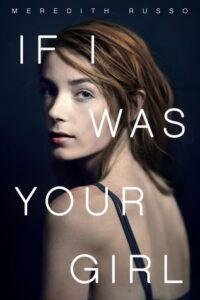 If I Was Your Girl by Meredith Russo
If I Was Your Girl by Meredith Russo
YA novel about a trans main character, written by a trans writer, featuring a trans cover model? YES!
This book is about changes in Amanda’s life, and not just the changes that come from transitioning. She’s in a new town, at a new school, living with a father she hasn’t seen in six years, and making new friends (for the first time in forever). She gets her first kiss and starts her first relationship. We see enough snippets of her past to know some of the things she’s been through, from suicide attempts to brutal assaults. She’s had varying levels of support, from a dad who still hasn’t “come to terms” with everything to a mom who quickly realizes that she’d rather her kid be trans than be dead. We learn a little about Amanda’s journey—understanding from little on that she was a girl, therapy, hormones, surgery, etc.
Amanda’s new friends and new start at a new school give her the chance to just live her life, for once, without being in constant fear. It takes her a little while to feel at ease, and there is a degree of worry underlying all the time, but she finally gets a chance to do things lots of teens typically do—go to football games and dances, be in a relationship, share secrets, and be supported and included. There is still fear and some ugly incidents, but for the most part this is a very positive, hopeful look at the life of a trans teen (something Russo addresses in the author’s note). At the beginning of Amanda’s story she tells us her goals for living in her new town: “I would keep my head down and keep quiet. I would graduate. I would go to college as far from the South as I could. I would live.” She soon realizes she has more options than that, than just simply trying to survive. She gets a chance to really start to live her life—the life she’s wanted to live for so long. A VERY welcome addition to the growing selection of books about trans teens—not to be missed. (See full review here.)
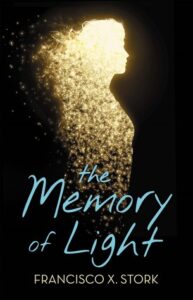 The Memory of Light by Francisco X. Stork
The Memory of Light by Francisco X. Stork
While the writing is outstanding and the characters well-drawn, it’s the real talk about mental illness that makes this novel stand out to me. Vicky often talks about the debilitating fog of depression, of the lies that depression makes a person believe. We learn that Mona is bipolar and see how that affects her, especially once she decides to give herself a little break from her medicine. Gabriel is possibly schizophrenic—he hears the voice of God telling him to give away his possessions and that he must die. The teens all talk about these very real illnesses and support each other when they each fall prey to believing in the lies, to feeling like they are to blame for their illnesses.
They struggle to accept their illnesses but are constantly reminded, by each other and their doctor, that what they have IS an illness and is real. The teens all come from different backgrounds and have varying levels of support or familial involvement in their treatment. They begin to really bond with each other, as the story goes on, and Vicky feels like in the hospital it’s five against one–her group and doctor against her depression. Each time we see her parents, we see so clearly how they just DO NOT get what is going on. Whether it’s ignorance—willful or otherwise–or denial, they don’t understand Vicky’s illness and make ridiculous demands on her once she leaves the hospital—get right back to school, get your grades back up, focus on getting into an Ivy League school (she’s a high school sophomore), get a job, BE FINE. Be better. Vicky, who is of course still struggling greatly with her depression, works hard to not be ashamed of what has happened and to be open with people about her needs right now. It is only after some very scary events go on with the friends in her treatment group that she can begin to make her family understand what mental illness really means and what they can do to support her.
This important book is an honest and candid look at mental illness, treatment, and recovery. The focus on therapy, medication, and support shows readers the many different ways to get help. The mental illnesses are handled sensitively, and the teens’ conversations go a long way toward encouraging open dialogues about mental health, acceptance, and the removal of stigma. (See the full review here.)
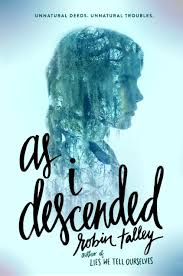 As I Descended by Robin Talley
As I Descended by Robin Talley
Something wicked comes to Virginia’s elite Acheron Academy in this modern retelling of one of Shakespeare’s darkest works. Overachiever and second-most-popular girl Maria, who is bisexual, and her scheming girlfriend, Lily, who is disabled and a lesbian, are determined to have Maria win the coveted Kingsley Prize, which guarantees entrance into any college and will enable the couple to stay together after high school. A séance reveals cryptic prophecies and opens the door to a plethora of spirits, leaving the girls unable to control their own action. Their cruel and manipulative plans to unseat the most popular girl are just the first of many schemes that go horribly wrong. Before long, Maria and Lily are not the only ones admitting to interacting with spirits. Students are having bad dreams, hearing phantom noises, and seeing ghosts. The couple’s desire for power grows, and what looked like ruthlessness now seems like madness. As the tragedy unfolds, no one at Acheron is safe—least of all Maria and Lily. Talley’s novel is ambitious but successfully so. The work address racism, classism, and homophobia, all couched in a horror retelling of Macbeth. Notably, all four of the main characters—Maria, Lily, Mateo, and Brandon—are not straight. Those familiar with the source material will not be surprised at how the story plays out, but knowing the eventual outcomes does not diminish Talley’s dark tale about fate and ambition. (See full review, which originally appeared in School Library Journal, here.)
BONUS: Books I didn’t review but absolutely LOVED
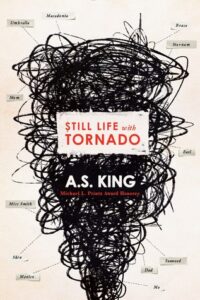 Still Life with Tornado by A.S. King
Still Life with Tornado by A.S. King
Read Cover Reveal + Interview: STILL LIFE WITH TORNADO by A. S. King for more on this great title. Here’s an excerpt:
I think teens in the early 21st century are facing some interesting challenges and if I went into them all, we’d be here all week. But on a more internal level, I write pretty widely about the underestimation and disrespect of teenagers in our culture and how it’s hurting not just present teenagers, but future adults (who are actually now adults). I love exploring the double-standard psychology of it. The superiority. The lying-to-save-them-from-the-truth. The eye-rolling. The near-instant mistrust and the near-non-existent patience. As humans, our growth doesn’t stop when we fit into adult-sized clothing. Not one person I know would treat a toddler the way they treat a teenager when the child trips over his own shoe or accidentally spills her cup of juice. Or when they cry. There’s a sort of systemic psychological hazing teenagers undergo in our country and it’s not something that’s easy to call out. It’s in the groundwater. It’s in the mindset now—in our DNA. I see college students rolling their eyes at high school students, and graduates of both rolling their eyes at all beneath them. It’s a cycle of condescension and alienation. It didn’t always used to be like this. We’re eating ourselves.
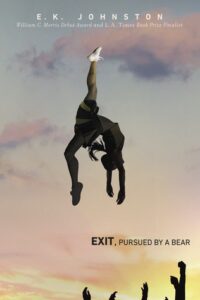 Exit, Pursued by a Bear by E.K. Johnston
Exit, Pursued by a Bear by E.K. Johnston
Read Karen’s review here. An excerpt:
Exit, Pursued by a Bear (from here on out referred to as EPB), is an intense emotional journey. There are rumors and there are whispers in the hallway, but Hermione is also fiercely supported by some key characters in the book, including her best friend Polly and her parents. Polly makes it very clear every step of the way that not only will she stand by Hermione through every step of this emotional journey with her best friend, but that she will not allow anyone to suggest that Hermione is in any way responsible for what happened to her. There is one scene where Hermione and Polly are being interviewed by the school paper and Polly says every thing we are thinking about rape culture and the way we talk to and about rape victims. Reading it was a sort of catharsis for me.
The friendship between Hermione and Polly is strong and fierce. It is hands down one of the best parts of the book and one of my new favorite friendships in YA lit.
Filed under: Uncategorized
About Amanda MacGregor
Amanda MacGregor works in an elementary library, loves dogs, and can be found on Twitter @CiteSomething.
ADVERTISEMENT
ADVERTISEMENT
SLJ Blog Network
2024 Books from Pura Belpré Winners
In Memorium: The Great Étienne Delessert Passes Away
Winnie-The-Pooh | Review
Parsing Religion in Public Schools
ADVERTISEMENT


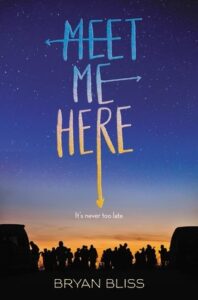
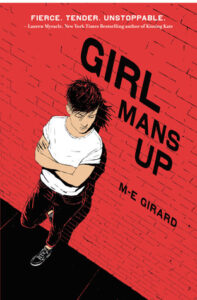
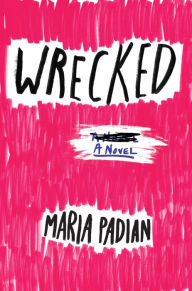

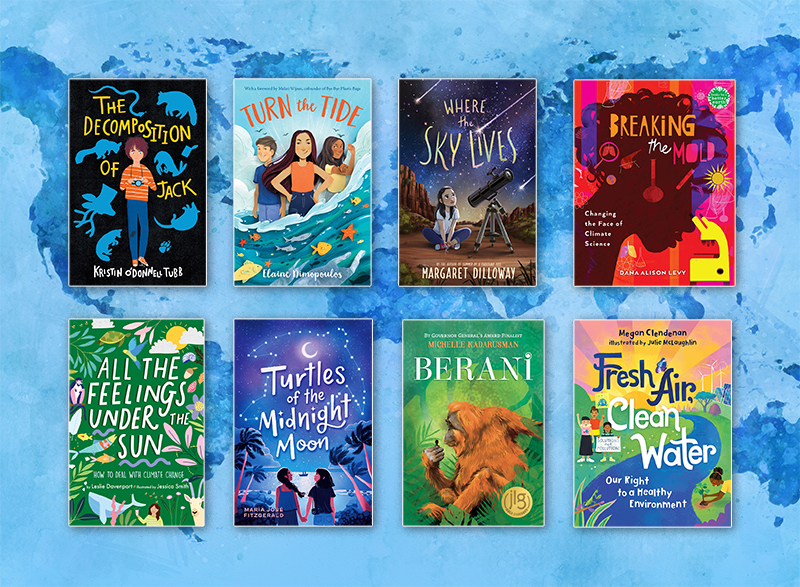
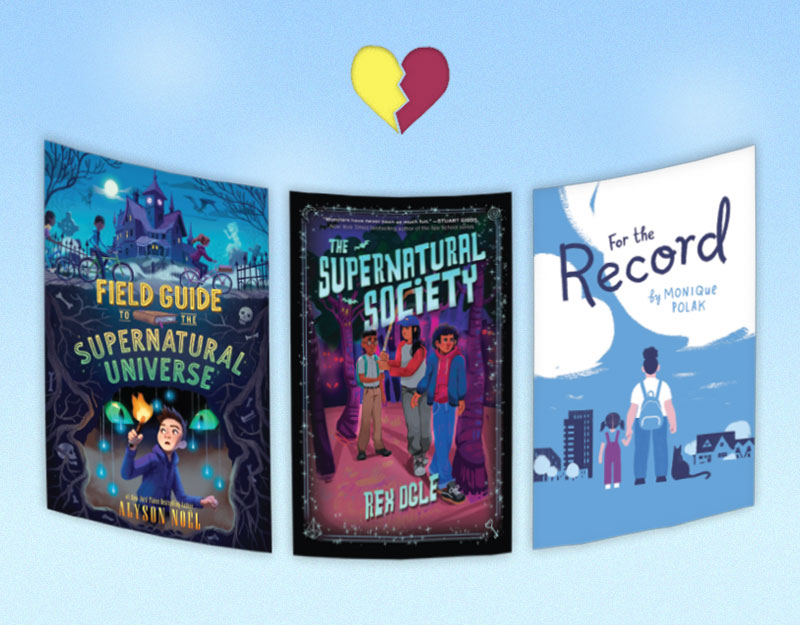
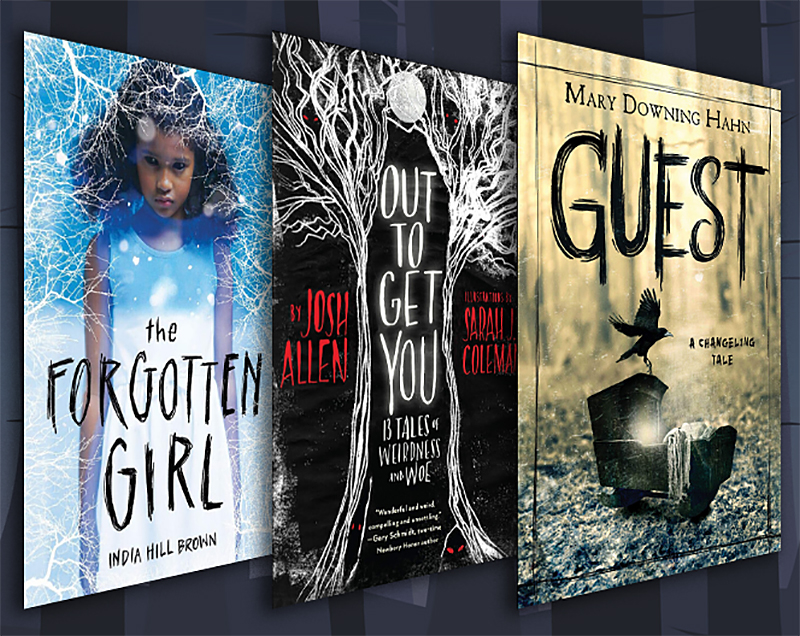
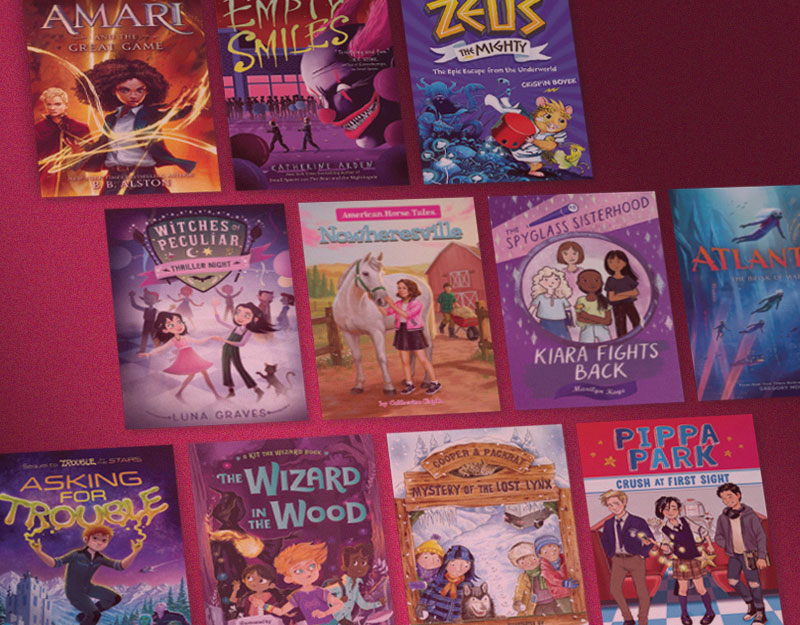
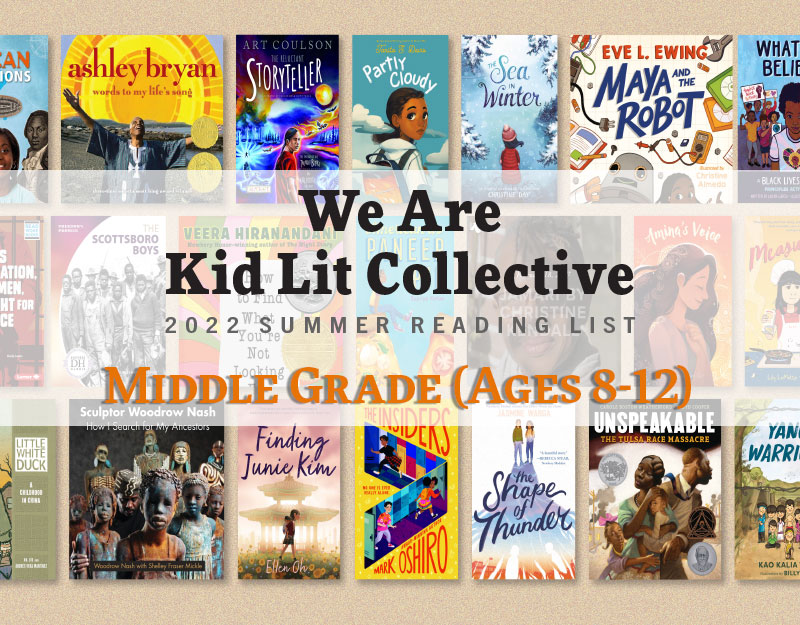
How have I missed ALL of these! Oh my, Christmas list!!!
You’re going to be busy reading:)
Some really terrific books here. Thanks for the list! I can’t help noticing, though, that all of these books fall into the category of “realistic fiction”. In my experience as a young adult librarian, books like these overwhelmingly appeal to girls. Guys tend to prefer horror, sci-fi, dystopian, sports, nonfiction, and fantasy. I tend to prefer realistic/historical fiction myself, but do we need to be more mindful as librarians and book sellers of reading outside our preferred genres?
Hi, so this is Karen, not Amanda. This is Amanda’s list of her favorite YA books of 2016. I do not wish to speak for Amanda, but I have some thoughts that I would like to share about your comment.
Amanda is our GLBTQA+ correspondent here, so she tends to read a lot in this area to review, compile lists, etc. for us here at TLT. In addition, she happens to be the most prolific reader I know, in any and all YA genres. She reads so many more books then she ever reviews here. She is also the reader and reviewer I respect more than anyone. When I have questions about a book, I text her because I know she has probably read it too (seriously, she is the most prolific reader I know) and because I know that she will review it critically and speak to me honestly, plus she works with and holds a lot of teen book discussions so she really has great insight to how teens read and feel about books. So when she puts together a best books list, I know that it comes from a huge well of possible titles and that she is looking for both quality and diversity of representation and appeal. I’m not sure that my experience agrees with your experience that realistic fiction is read and preferred by girls and that guys tend to prefer horror, sci-fi, dystopian, sports, nonfiction and fantasy. If you haven’t read some of the titles, you should seriously give them a read, I think they will surprise you.
Karen
Thanks for this comment, Lisa. It’s absolutely important to read widely in all genres to be able to best recommend titles to teen readers. I know librarians, booksellers, and teachers are always on the lookout for ways to serve all teens. I read far more books than I end up reviewing here on TLT, but my preference is definitely realistic fiction (though titles on this list include magical realism, science fiction, and thriller/horror). As far as this list, it’s my personal favorites of the year of things I have reviewed. Were I making this list to distribute to a school or to have available in a public library, I would focus on including more genres, not because I feel any one genre appeals any more than another to any gender, but for a wider diversity of reading options.
Thanks for your thoughts, Amanda and Karen. I certainly doesn’t question your commitment to YA literature, or judgment about quality. This truly is a great list! I’ve read some of them, and they are fantastic. I also don’t want to put readers in a box, or suggest that guys don’t like realistic fiction. Over and over, though, I see guys going in different directions. I curate a huge list of books for summer reading every year — our summer reading program is all about choice for the kids, and we meet with kids in small groups in September to talk about their books. Every year, without fail, we see guys going for “guy” books (horror, sci-fi, sports, graphic novels, epic fantasy, and nonfiction), and girls choosing realistic fiction (problem novels & books about relationships; sometimes historical fiction.) I fought the urge for years to make judgments about reading preferences along some kind of gender line, but the pattern seems to hold. We are also a very LGBTQ-friendly library — we work hard to help these kids see themselves in books. So I always appreciate hearing about new titles there. I’m also very excited about the titles here that address trauma and mental illness. These will be great additions to our psychology choice read unit. So truly, I appreciate the list. So many great books! Thanks for the list, and the discussion.
Thank you so much for this list! I hadn’t seen Whatever yet, but the description kind of reminded me of Skam so I picked it up and LOVED it! There are a few other titles in this list that I haven’t read yet and will definitely be checking them out!